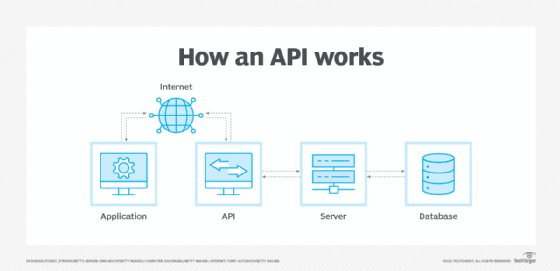API economy
What is the API economy?
The API economy refers to the set of business models and practices designed around the use of application programming interfaces (APIs) in today's digital economy. It involves the exposure of an organization's digital services and assets through APIs in a controlled way.
APIs ensure the data extracted from one software application is formatted and passed to the next application securely and accurately, even if the associated application's feature sets have been updated. Essentially, they allow two applications to seamlessly communicate and share data with each other.

There are different types of APIs, including internal APIs, which are intended for use only within an organization; public APIs, which are open and for use by any outside developer; and partner APIs, which are only available to specifically selected and authorized outside developers. There are also various API protocols, such as Representational State Transfer APIs, Simple Object Access Protocol APIs and remote APIs.
The API economy is the value exchange between API providers and consumers. For example, an organization can choose to make its services and assets available for third-party developers by billing them for the use of their APIs. This way, instead of having developers building their own application, they can use the existing services and information provided by an external API to speed up development.
Examples of the API economy
There are many examples of organizations that take part in the API economy, including the following:
- Google Maps API. Google lets third parties such as Uber use its Maps API. The ride-sharing company then uses the API to power its maps, so it doesn't have to build its own system.
- Slack API. The business messaging platform Slack provides its API to enable integrations with its platform. For example, the cross-platform collaboration software, Mio, uses the Slack API to send and receive messages across Slack and Microsoft Teams.
- Airbnb API. The Airbnb API is provided to third-party developers to create integrations and other content around Airbnb. For example, the sales and channel management platform HotelRunner uses the Airbnb API to let hosts list their rooms on Airbnb directly.
- Square API. The payment processor Square offers its API to businesses to process payments, manage subscriptions and provide other features such as sending invoices. For example, the food delivery company Postmates uses Square's API to push orders from its ordering app to Square's point-of-sale system.
Some businesses set up a monetization model around the use of their APIs, while others provide their APIs for free. Pricing can be tiered based on per-API request.
The effects of the API economy on businesses
The ultimate goal of the API economy is to facilitate the creation of user-focused apps that support line-of-business goals and improve workforce throughput. While API tools have always played an important role in software development, today's demand for data integration has encouraged vendors of all sizes to go modular and break complex software components into smaller, containerized components called microservices.
The API economy and the use of microservices make data and services more accessible and flexible. By building a business model around APIs, businesses can rapidly scale up. This can be done by organizations accessing third-party services and data or by offering the organization's APIs to a platform that encourages others to build upon and use them.
How APIs are offered or changes to API pricing can also have an effect on surrounding businesses. For example, in 2023, the website Reddit found itself in controversy when it announced it would start charging developers 24 cents per 1,000 API requests to access its previously free API. Following this change, many popular third-party applications, such as Apollo, shut down as they couldn't afford the new costs. For reference, applications like Apollo can make more than 7 billion API requests per month, costing a potential $2 million a month.
The importance of the API economy
APIs simplify access to software functionality and the information contained in it. They make software platforms and their data easier to integrate. The API economy is important because it lets businesses profit from their APIs and create business models around them. It allows a business to monetize a portion of its data and services, and to turn itself into a platform.
The proliferation and growth of mobile computing and the internet of things (IoT) are partially responsible for the increased demand for data integration. This is due to the sheer amount of data they create and the varied spectrum of devices and accompanying programs they use to process that data. APIs are the building blocks of IoT because they let IoT devices communicate quickly without a human user present.
Instead of building all the APIs that IoT and mobile devices use from scratch, developers can mix and match APIs from different sources to allow interoperability, customizability and efficiency to meet increasing consumer demands.
Benefits of the API economy
The main benefit of the API economy is increased access to and use of APIs.
Another benefit of the API economy is that it allows and encourages consumers to collaborate with API providers to deliver more engaging and efficient user experiences. APIs and microservices can be stacked, modified and improved faster than products in a physical economy. This lets organizations streamline business processes and participate in previously inaccessible business ecosystems through the increased flexibility, agility and data access APIs afford them.
Additional benefits include:
- Continuous improvement. APIs are open to third parties to be customized and altered.
- Better customer experience. Because APIs are open to customization, users and providers can alter them and provide feedback to optimize customer experience.
- Faster product delivery. The API economy creates a set of open, industry-approved tools that developers can choose from instead of creating them from scratch.
- Additional revenue. Because products can get to market faster, companies have more freedom to experiment and find new ways of generating revenue.
- Collaboration. Organizations not traditionally considered software companies can take advantage of APIs to improve their business in ways that would be impossible if they had to hand-code their own proprietary software. The API economy equalizes the playing field, allowing large enterprises, SMBs and small developers to collaborate using the same tools.
Challenges of the API economy
As managers look for creative ways to monetize services and assets through APIs, vendors will need to make API management simpler to accommodate the needs of non-technical developers in low-code software development environments.
Other challenges facing the API economy include the following:
- Security. The API economy involves making a small portion of company data and services available to other members of the economy. High-risk attacks include broken object-level authorization. An attacker can manipulate the ID of an object in an API request, allowing an unauthorized user to read or delete another user's data.
- Management. Visibility in APIs is important, as managing APIs, back-end systems and infrastructure could become a challenge.
- API aggregators. When an entity gains a large enough base of digital users, it monopolizes a section of the API economy and can control the terms of API usage -- also known as holding data hostage. This destroys competition in the market and limits businesses that rely on that provider, as there are no other options. One example of this is X (formerly known as Twitter), which has a reputation for consistently overhauling and restricting its API, which is challenging for companies that rely on the firm's API.
The goal of API security is to ensure API requests are authenticated, authorized, validated, cleansed and can still be processed under load. Discover 12 API security best practices that can aid in securing APIs in the API economy.







